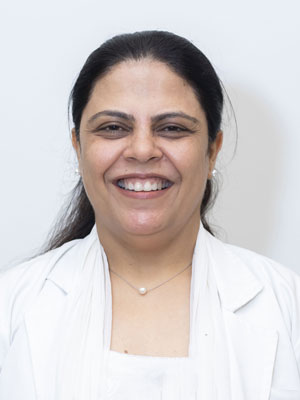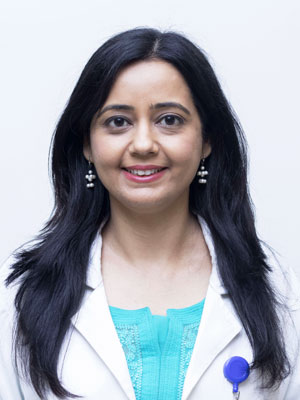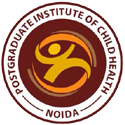Introduction
The Department of Microbiology is functional since December 2015 at the institute. The diagnostic Microbiology Laboratory was designed from scratch and currently is a multidisciplinary unit consisting of Bacteriology, Virology, Mycology, Immunology, Serology, Parasitology, Mycobacteriology, Infection Control and Molecular Biology Laboratory sections.
Vision
To make a significant contribution and impact in diagnostics, academics, research and training in the field of Paediatric infectious diseases both at National and International level
Name of the Faculty

Dr Sumi Nandwani
Designation: Professor cum Chief Consultant, H.OD.Microbiology & Sub – Dean
Qualification: MBBS, M.D (Microbiology), DNB (Microbiology), MNAMS, PGCHM
Special Interest: Paediatric Infectious diseases, Malaria, Mycobacteriology, Hepatitis, Virology, Immunology, Bio Medical Waste Management, Hospital Infection Control and PG Medical Education.

Dr Naz Perween
Designation: Associate Professor-cum/or Senior Consultant
Qualification: MBBS, M.D (Microbiology)
Special Interest: Bacteriology, Serology, Mycology, Parasitology
Patient Services
Available Diagnostic and Hospital Services:
Microbiology department provides comprehensive Diagnostic Facilities for Infectious Diseases including Bacteriology, Mycobacteriology, Parasitology, Serology, Immunology, Virology, Mycology, and Molecular Biology facilities and Hospital Services including participation in Hospital Infection Control and Bio Medical Waste management programs
- Bacteriology: Routine and Automated Culture, Automated Bacterial Identification and Antibiotic Susceptibility, Microscopy (Gram staining & Special staining)
- Mycobacteriology: AFB Staining, (ZN & Fluorescent), Automated TB Culture
- Parasitology: Malaria Microscopy, Malaria antigen, Stool routine Microscopy, Opportunistic Parasites, Faecal Occult Blood, Special staining for Parasites.
- Serology: Bacterial Serology-RPR/VDRL, Widal, S typhi IgM Ab, Meningitis Ag
- Immunology: Infectious and Sepsis Proinflammatory Markers- CRP (C- Reactive protein- Qualitative & Quantitative), PCT (Procalcitonin), ASO (Anti Streptolysin O), RA (Rheumatoid factor)
- Virology: Hepatitis testing (anti Hepatitis A Virus IgM Ab, anti-Hepatitis C Virus Ab, Fourth generation Hepatitis Bs Ag, Hepatitis B profile- Anti HBs Ab titer, Anti HBc IgM and total Ab, HBe Ag and Anti HBe Ab) by ELISA/ ELFA, anti-HIV Ab as per NACO and Dengue (NS1Ag and IgM Ab by ELISA)
- Mycology: Fungal Microscopy and Culture, Automated Yeast identification and Antifungal Sensitivity Testing for yeasts.
- Infection Control: Infection Surveillance with Air monitoring, Water testing, Passive & High-Risk area and Outbreak surveillance and participation in Hospital Infection Control Programs including Antimicrobial Stewardship and Bio Medical Waste Management programs.
- Molecular Biology and Research facility: Molecular identification of isolates and research work
- Quality Assurance: The department participates in internal and external Quality Assurance Programs (IAMM EQAS – Indian Association of Medical Microbiology) to ensure precise and quality results.
Academic Events
Academic Events Organized:
- Oct 2018: CME on ‘Bio Medical Waste Management’ as a part of ‘Swachh Bharat Diwas’.
- Nov 2018: Regional level (North India region) CME under aegis of IAMM (Indian association of Medical Microbiology) on ‘RECENT ADVANCES IN DIAGNOSTIC MICROBIOLOGY: A Diagnostic Update for Paediatric Infectious Diseases’
- May 2019: ‘World Hand Hygiene Day’ Awareness Program
Other Academic Activities:
- Public Health Lectures and participation of faculty in Community Service activities including Health checkup camps and talks in schools.
- Regular Participation of faculty in CMEs in interdepartmental academic meets at the Institute.
- Intradepartmental Seminars and Journal clubs once a month.
- Regular Participation of faculty as executive members and faculty in Academic Events, CMEs and Conferences at State, National and International level.
Courses/ Training Offered
- Short Term Trainings (3- 6 months) in Microbiology Laboratory diagnostic services for Laboratory technicians and BSc/MSc. Microbiology students.
- Regular trainings and lectures for Paramedical Staff (Laboratory Technicians, Nursing staff & attendants) of the institute.
Educative Material
Souvenir 2018- Update on ‘Microbiology Services in SSPHPGTI, Noida’
Research Projects
- ‘A Comparative Evaluation of Recent Techniques Using Pro-Inflammatory Markers for Diagnosis of Sepsis in Paediatric Patients’ – Dr Sumi Nandwani (PI), Dr Sumit Rai (Co I)
- ‘Molecular Surveillance for Presence of Linezolid Resistance among Clinical Isolates of Vancomycin Resistant Enterococcus and Methicillin Resistant Staphylococcus Aureus and Their Clinical Correlates’- Dr Sumit Rai (PI), Dr Sumi Nandwani (Co I)
Rest under process –submitted to ethical Committee for approval
Publications
In Journals
- Development, optimization, standardization, and validation of a simple in-house agar gradient method to determine minimum inhibitory concentration of vancomycin for Staphylococcus aureus. Rai S, Tandon M, Singh NP, Manchanda V, Kaur IR. J Lab Physicians. 2019 Jul-Sep;11(3):220-228. (Original Article)
- Oral Candida Carriage Including Speciation, Biofilm Production and Correlation with Occurrence of Dental Caries in Student Population. Nandwani S. International Journal of Scientific Research.ISSN No2277-8179, 2019, Vol 8, issue 8:1-2. (Original Article)
- Is empirical use of the antibiotic combination of cefuroxime and clavulanic acid rational? Gupta H, Gupta R, Rai S, Himanshu Kataria, Vineet Jain, Vivek Shankar. Journal of Global Antimicrobial Resistance, Volume 16, March 2019, Pages 150-151.(Letter to the Editor)
- Predictors for gut colonization of Carbapenem Resistant Enterobacteriaceae in neonates in a neonatal intensive care unit. Singh NP, Choudhury DD, Gupta K, Rai S, Batra P, Manchanda V, Saha R, Kaur IR. American Journal of Infection Control 2018; 46; 31-35. (Original Article)
- Evaluation of Role of GnRH Antagonist in Intrauterine Insemination (IUI) Cycles with Mild Ovarian Hyperstimulation (MOH): A Prospective Randomized Study.Leena Wadhwa, Sumi Nandwani, Rupali Khanna, Taru Gupta, Sangeeta Gupta, Sarika Arora. The Journal of Obstetrics and Gynecology of India .2016.66(Suppl 1): 459. (Original Article).
- Prevalence of multidrug – Resistant and Extensively Drug – Resistant Proteus, Providencia and Morganella species in Burn wound Infraction.: Naz Perween, S. Krishna Prakash, Tanisha Bharara. International Journal of Scientific Study.February 2016.vol3. Issue II. (Original Article).
- Bacterial Conjunctivitis: Microbiological profile, Antimicrobial Susceptibility Patterns and Recommendations for Treatment. Naz Perween, Dakshina Bisht, Prabhav Aggarwal. J. Commun, Dis. 2016; 48(1). (Original Article).
- Nosocomial Burn wound Infections due to Non-Fermenting gram Negative Bacteria: Our Experiences from A Tertiary Care Centre in North India. Naz Perween, S. Krishna Prakash, Prabhav Aggawal, Lalit Mohan Gupta Anna’s of Pathology and Laboratory Medicine, Vol 03, no 05, (SUPPI) 2016. (Original Article).
- Oral Azithromycin for Acute Episodic Airway Symptoms in Young Children: Evidence-based Medicine Viewpoint. Mathew JL, Rai S, Sahi P, Kumar V. Indian Pediatr. 2016;53(3):244-7 (Journal Club).
- Breaking the “One Disease, One Organism Myth”. Rai S.Indian Paediatrics 2016;53:115-116 (Editorial)
Chapters in books
11. Chapter 7: ‘NURSING CARE OF INFECTED PATIENT’-Sumi Nandwani in E Book titled ‘Nursing for Communicable Diseases and STI’s by ‘Centre for continuing Nursing Excellence’, under publication.2019
Contact Details
Email: ssphpgtimicrobiology@gmail.com
Future Plans
- To develop as a tertiary referral Microbiology diagnostic laboratory for Paediatric infectious diseases.
- To provide latest Molecular methods for Diagnosis and Drug Resistance detection of infections and develop an advanced Virology diagnostic laboratory.
- Laboratory Accreditation from National and International Bodies.
- To start academic teaching programs (Post Graduate: MD Microbiology, Post-Doctoral Certificate Course (PDCC) and Fellowships in Paediatric Infectious Diseases.

